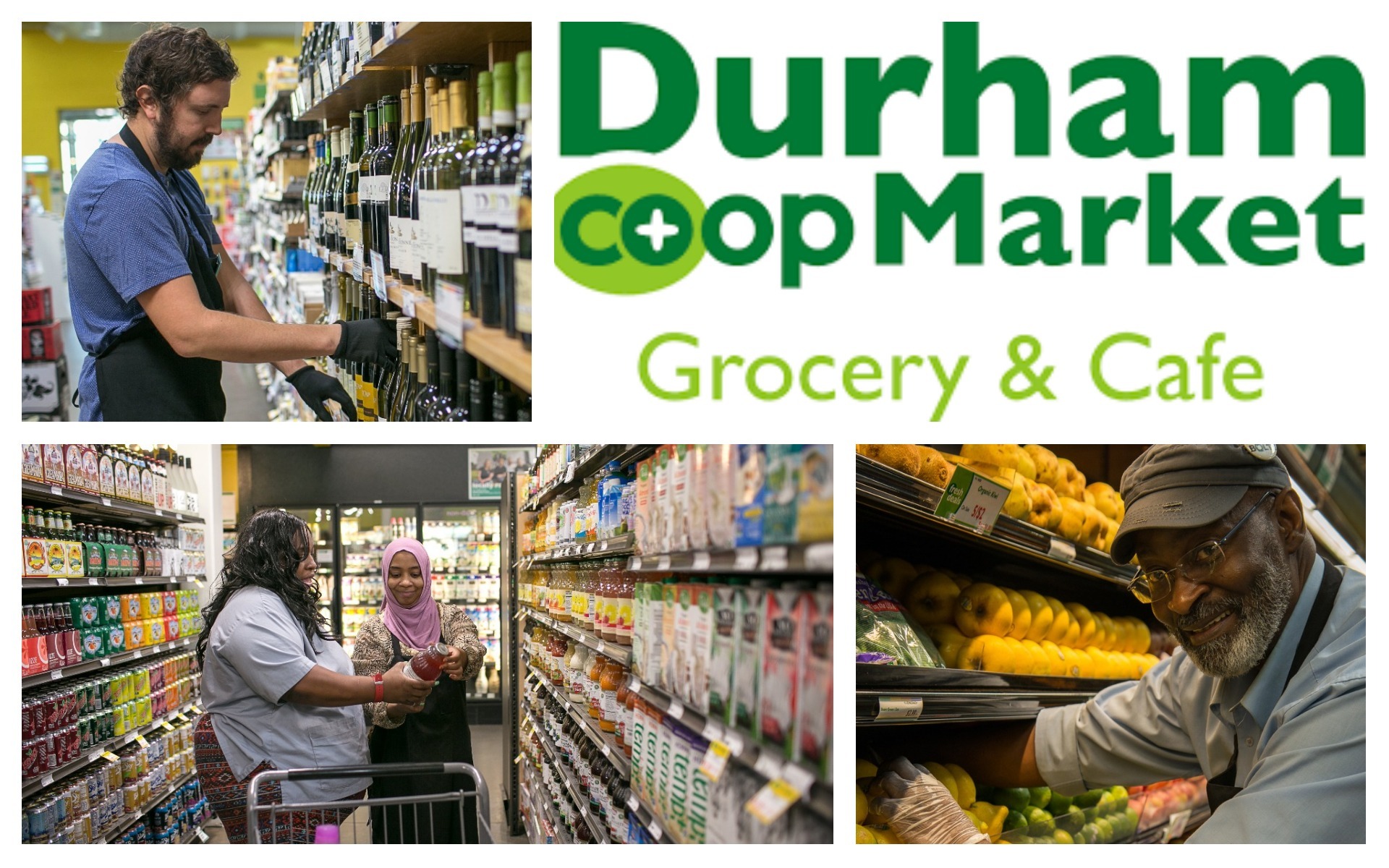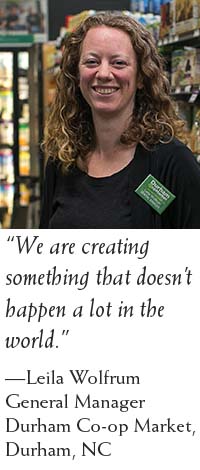
Durham Co-op Market
Durham, NC
Year founded: 2015
Number of members: 4,000
Member investment: $100
Number of employees: 50
Retail square feet: 8,000
The startup vision for Durham Co-op Market in Durham, NC was to be a very inclusive organization, one that would be an integral part of the community in which it was located. It was important to the founding members that all neighbors had a voice in the co-op’s development. The co-op is situated in a commercial district on the border of two neighborhoods, one predominately white and affluent, and the other poorer and African American.
The co-op’s organizers held many town hall meetings, met with neighborhood organizations and churches, and encouraged a wide variety of people to serve on the board. As the co-op was being built, they knew it would be an impactful building, and sought to make sure that it was aesthetically pleasing and very pedestrian friendly.
“In the south, we have a complicated economic and social history,” said Leila Wolfrum, Durham’s general manager. “The co-op worked hard not to replicate that.”
 One of the co-op’s main benefit to the community included the addition of 50 jobs when it opened, and it wanted the process of hiring to be equitable. “We want to provide jobs for people for whom opportunities are valuable, people who have experienced significant barriers to employment, like past incarceration, substance dependence or gaps in employment,” Wolfrum said.
One of the co-op’s main benefit to the community included the addition of 50 jobs when it opened, and it wanted the process of hiring to be equitable. “We want to provide jobs for people for whom opportunities are valuable, people who have experienced significant barriers to employment, like past incarceration, substance dependence or gaps in employment,” Wolfrum said.
This required deep attention to hiring practices, training and co-op culture building. “We did not want to make any assumptions that would exclude someone,” she said. The co-op focused on training for fundamental skills and hiring for attitude over experience. “You can’t train someone to love a community. We wanted to hire people who are already invested in the community.”
The co-op has been successful in creating a diverse workplace, where a majority of workers are people of color. “We try to create a community to represent every spectrum, including ethnicity, gender, sexual preference, age and religion.” Wolfrum said that this requires that their culture-building is intentionally inclusive. “We stress that everyone needs to be open and respectful of their coworkers.”
Wolfrum said that managers also need to be especially skilled at leading in a diverse environment. They are continually attending training workshops and hiring consultants to help them with being better leaders, as well as to provide tools for advancement for all employees. “We have a tremendous staff guided by a lot of intention. We are stronger and more agile in the community because of this work.”
The co-op is also actively breaking down barriers for potential customers. “It’s impossible to serve a whole community if you don’t serve everyone who is in that community,” Wolfrum said, and one of their biggest challenges is the affordability of healthy food. “It’s the biggest barrier.” Some people have the perception that not only is the co-op’s food expensive, it is “weird.” It has led the co-op to be innovative in serving an economically diverse community.
Part of that is evaluating what they sell, and how they are perceived in the marketplace. They have created systems to be more accessible and affordable, first by offering good, better, and best product choices on a continuum of conventional, natural and organic.
They’ve also developed a Food For All needs based discount that is supported by a round-up at the cash register. “Those who can afford it can contribute. It’s been a community building tool for us, and exciting that people care to make the co-op accessible to others.”
Once a week they also offer a $3 Community Dinner of simple, good meals, like chili and corn bread, soup and mac and cheese, and chicken or vegetable curry. “People love it. It’s very family friendly and we usually attract 500 people who come to eat and listen to music. It helps people incorporate the co-op into their daily routine,” Wolfrum said
Durham Co-op Market has been a model in the food co-op sector for how to be an inclusive and equitable business, but that doesn’t mean anyone is resting on their laurels. Quite the opposite. They continually push themselves past the comfort zone. “What we have succeeded at is making sure our organization is committed to it, but it is hard work, and we are flawed all the time.”
“We are seeking to accommodate people’s needs and run an excellent grocery store. We actively engage with these questions all the time and incorporate people into the conversation, so they can be part of it.” Wolfrum recognizes their approach is unique, but believes that their efforts make the co-op stronger and better. “We are creating something that doesn’t happen a lot in the world.”
Have more questions?
Get in touch with one of our consultants.
